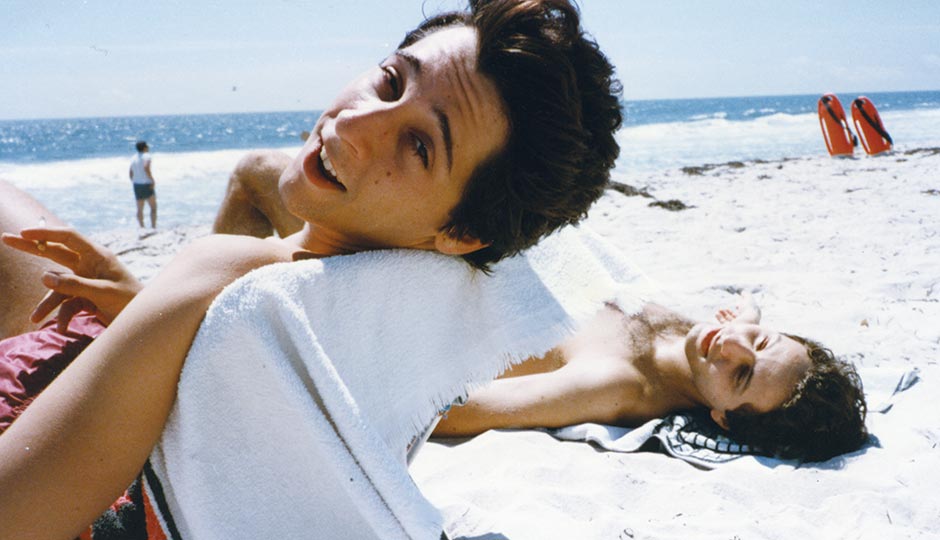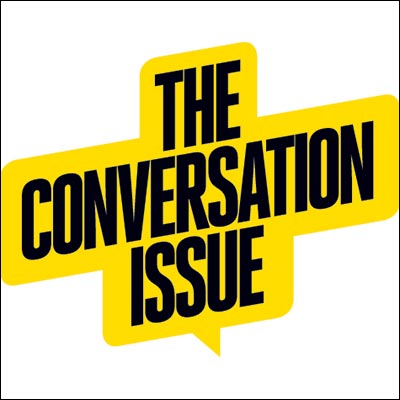Former Ambassador Joe Torsella and FringeArts’s Nick Stuccio on Friendship

Joe Torsella and Nick Stuccio on Long Beach Island, 1985.
PM: You guys have both had successful careers. Joe, you launched the Constitution Center and were recently an ambassador to the U.N. Nick, you founded FringeArts. And you’ve known each other since you went to high school together in northeastern Pennsylvania.
JOE: I actually am responsible for all of Nick’s success, by virtue of our high-school relationship. That seems bold, I know.
NICK: But it’s kinda true.
JOE: We met each other in early high school, I think in Mrs. Podesta’s … what was the class, geometry?
NICK: Geometry. We knew each other casually. But we became friends when Joe here decided to direct a play. Because Joe was going to be a famous theater director.
JOE: I was voted most artistic in my high-school class.
NICK: [laughs]
JOE: You didn’t vote for me?
NICK: Frankly, no.
JOE: I was into theater and music. So I directed this play, The Good Doctor, by Neil Simon.
NICK: But wait a minute, if I may just say: We went to this very stodgy college preparatory school where a student doesn’t direct a play.
JOE: I think it was the first time it happened, actually.
NICK: So that was pretty amazing. That’s kinda ballsy. I was not into theater. I was into girls.
JOE: Nick was a very cool kid.
NICK: I was, Joe.
JOE: I could have been, but I didn’t want to. [laughs]
NICK: Mmm … ehh … you’re kinda born with it or you’re not.
JOE: So Nick’s cool rubbed off on me a little bit.
NICK: I gave him entrée to the cool kids.
JOE: Can I get to the part about how I created Fringe? So I cast Nick — seeing in him something no one else had seen — as the lead in The Good Doctor. And he was quite good at it.
NICK: No, I was terrible. But I did fall in love with the theater. With being onstage.
JOE: Then he went to Skidmore College and got into dance. And I honestly don’t think in his whole life …
NICK: I’ve ever thanked you for setting me on that course?
JOE: His entire arts career was determined at that moment, when I cast him in The Good Doctor. Therefore, I really started the Fringe.
NICK: [laughs] You know, goddammit, it’s true. I have to say. It is true.
PM: What’s made your friendship last?
JOE: We come from very similar backgrounds. There’s a certain Italian-American quality to our family lives that made it easy for us to connect. And I think Nick had a kind of Italian sensibility about life, even then, that is one of the reasons we became and stayed friends.
NICK: If you were going to pick the topics we could talk about,
they
would be food, family, fishing.
JOE: [to Stuccio] Would you have predicted in high school that we would stay friends for life?
NICK: No. No. But we have.
JOE: I actually would have. I think it helps that we ended up in the same place. And by the way, Nick’s civic successes have inspired mine. And I think vice versa. Nick brought the Fringe to Philadelphia against the skepticism of people. And I think he and I are alike in that, and I think that’s why we sort of encourage each other. When you meet someone when you’re 40 or 50, you have a certain kind of persona you’ve established. But someone you’ve known since you were 15 and you’ve been through all these embarrassing moments with … all of them Nick’s, of course …
NICK: We’re going to share them all with you.
JOE: It’s a lovely gift, and it’s an easier friendship than trying to maintain the successful veneer of adulthood. It’s more relaxing for me to spend time with Nick than almost anybody else, because it doesn’t feel like I’m pretending to be anybody else.
NICK: So …
JOE: You should say something nice about me now.
NICK: [laughs] I will say, even as 15-year-olds, I respected him so much. He’s the smartest guy I ever met in my life. And he’s funny as hell.
JOE: You thought that at 15?
NICK: Absolutely. I told that story of being so impressed by what this student did, directing a play. I was attracted to the fact that as a young student, this guy was saying fuck you to this institution and doing whatever he wanted. Does that work for you?
JOE: It’s a start.
NICK: If you become president, what will be my role in your administration? Can you create a cabinet-level position for, say, arts and culture? I’d be good.
JOE: Based on the Fringe’s role in the early days of the Constitution Center, it might be wise for there to be a separation between you and me.
NICK: [laughs] The culture’s moved to the left since then on those issues, Joe.
JOE: In the early, early days of the Constitution Center, like my first month there, we had this thing called Constitution Day. We had about $200 to spend. And I called Nick to ask if he could help us with some entertainment. This is when Ed Rendell was chair of the Constitution Center board. And Nick said, sure, I’ll send something over. So we had this patriotic ceremony at the Bourse, with Rendell and veterans and older people who might give money to the Constitution Center.
NICK: Were they really that conservative? Oh Jesus.
JOE: So Nick sends over a performing-arts group that was kind of, uh, countercultural. And Rendell, who doesn’t have a great sense of hearing, is squinting, trying to understand the words, which, as I listen closely, involve things like piercings and body parts …
NICK: It was a queer musical that was the hit of the festival that year. The song was called —
JOE: I wasn’t even going to say what the song was called.
NICK: Do you remember? “In My Body.” Now, the tune itself was very catchy!
JOE: I’m offering this as an example of how Nick sensitively helps a friend in need with exactly what’s required at the moment. John Philip Sousa would have been perfect.
NICK: Rendell was like, pull the fucking plug.
PM: How much do you see each other these days?
JOE: We text. We don’t call so much. We go on regular outdoorsy trips.
NICK: With the kids and family, it’s impossible.
JOE: We both are very family-oriented. Nick and his family were staying with us last year. And I was cooking, and Luca [Nick’s son] was fascinated.
NICK: We made a big family dinner, and Luca, who loves to cook and eat, and Joe made dinner together. It was awesome.
PM: C.S. Lewis said, “Friendship has no survival value. Rather, it is one of those things that give value to survival.” Agree?
NICK: As I get older, and as our kids get older and more independent, I do imagine our friendship getting more —
JOE: Getting more unencumbered by some of the middle-age things. I can see a time when there’s more time for puttering and friendship in a different way.
NICK: The times we do get together, I think I’m enjoying more. Friendship is becoming more acute. I feel that need for it, I would say.
JOE: I feel like I’m not especially good at friendship. I have a huge circle of people I’m acquainted with. And I have a family and kids. But friendship adds value to life.
NICK: We don’t have to worry about each other. We don’t have to worry about maintaining the friendship. We just are. We’re old friends.
Originally published as “Joe Torsella and Nick Stuccio on Friendship” in the November 2014 issue of Philadelphia magazine.
Read more from our Conversation Issue.



